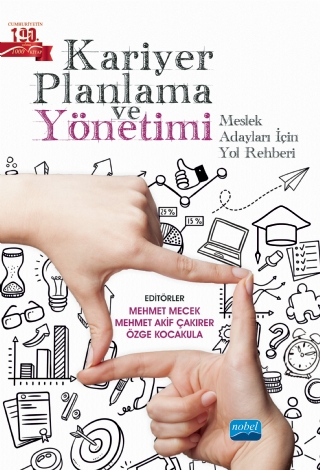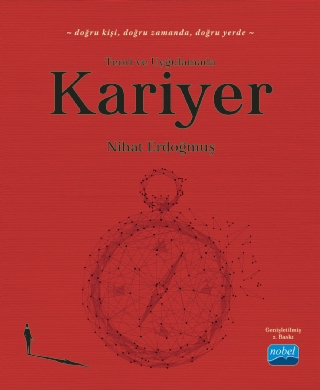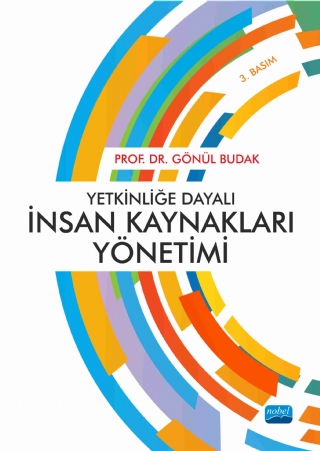Management - Human Resources \ 1-1

The indispensable element for all businesses is people. For this reason, businesses that attach importance to the selection, placement, training, promotion, evaluation and retirement of their employees have always been successful in business life.
The human resources management book is a resource that people or institutions that want to be successful in the processes from the recruitment of the personnel to their retirement can apply.
The human resources management book is a resource that people or institutions that want to be successful in the processes from the recruitment of the personnel to their retirement can apply.

Let's go to 2050 for a moment. There are no wars left in the world. There is abundance in every country. There is no income distribution problem, poverty is almost over. Boundaries between countries have been removed. All production steps that require muscle power are made with real robots. Robots even design works of art. All unfinished symphonies, novels, scientific works and films are completed by artificial intelligence. He who wants immortality is being cloned.
Turkey is one of the rare countries that has established a colony on the Moon. A global power that has overcome environmental problems thanks to space mining. One of the few states that has created its own blockchain. Earth is a peaceful planet. The population has dwindled to half of what it is today.
People? They are programmed before they are born. They mainly devote time to philosophy, art and aesthetics.
Did you find this short projection unrealistic? You asked, so let's go back to the present.
Be prepared to face the following challenges:
• New technologies that fundamentally change the design of work,
• New expectations and values in the workplace,
• workforce skill gap,
• Workplaces where employee loyalty decreases,
• The increase in the population consisting of long-term and even educated unemployed,
• The demographically changing labor market,
• A young generation that is not equipped enough for the business world,
• A troubled economic and social structure with regional and urban divisions.
Section author(s) who care for the richness of the literature; they discussed the business world from their own perspective within the scope of HRM discipline. While emphasizing the behavioral dimension of human resources management, on the other hand, the future orientations of human existence are approached glocally. Network quotes collected from social media, which sometimes point to a situation or a problem, and sometimes make you laugh/think, are scattered throughout the book. In addition, the link and QR codes of the relevant videos from social media are placed at the end of the chapters. The reader's interest was kept alive with the case studies and movie recommendations that were scripted or selected from daily life.
Target audience of the book:
• Students who receive undergraduate and graduate education in the field of HRM,
• Researchers and academics working in the field of HRM,
• HR managers and professionals,
• Employees and managers at all levels who are interested in the field of HRM.
• Good reading...
Turkey is one of the rare countries that has established a colony on the Moon. A global power that has overcome environmental problems thanks to space mining. One of the few states that has created its own blockchain. Earth is a peaceful planet. The population has dwindled to half of what it is today.
People? They are programmed before they are born. They mainly devote time to philosophy, art and aesthetics.
Did you find this short projection unrealistic? You asked, so let's go back to the present.
Be prepared to face the following challenges:
• New technologies that fundamentally change the design of work,
• New expectations and values in the workplace,
• workforce skill gap,
• Workplaces where employee loyalty decreases,
• The increase in the population consisting of long-term and even educated unemployed,
• The demographically changing labor market,
• A young generation that is not equipped enough for the business world,
• A troubled economic and social structure with regional and urban divisions.
Section author(s) who care for the richness of the literature; they discussed the business world from their own perspective within the scope of HRM discipline. While emphasizing the behavioral dimension of human resources management, on the other hand, the future orientations of human existence are approached glocally. Network quotes collected from social media, which sometimes point to a situation or a problem, and sometimes make you laugh/think, are scattered throughout the book. In addition, the link and QR codes of the relevant videos from social media are placed at the end of the chapters. The reader's interest was kept alive with the case studies and movie recommendations that were scripted or selected from daily life.
Target audience of the book:
• Students who receive undergraduate and graduate education in the field of HRM,
• Researchers and academics working in the field of HRM,
• HR managers and professionals,
• Employees and managers at all levels who are interested in the field of HRM.
• Good reading...

Career planning refers to the strategy one uses to set career goals and the ways to reach those goals. Having a career plan is critical for candidates who want to be successful not only in business but in all areas of life. Career planning is a multi-stage process in which career stages must be comprehensively addressed and executed in order for the candidate to achieve the success they want to achieve. With career planning, the candidate will have the chance to think in advance about alternative ways and routes for his future professional life, so that he will be able to construct his career journey on a “scenario-based” basis. A thoughtful career plan will both shape social life and provide a roadmap for the professional future. Thus, it will be possible to make informed choices about current job opportunities and potential future career opportunities. This book has been prepared with the contributions of expert academics, aimed at candidates, academics and professionals in business life who are looking for a guide both to see the current opportunities in their career journey and to explore potential career opportunities in the future. In each section, besides theoretical information, success stories of real people in their career journeys, advisory opinions given by experts in the field to candidates related to the subject, and additional reading suggestions for readers who want to deepen in the relevant section, as well as movie recommendations are given. We wish you a pleasant reading, hoping that it will be a useful guide for all readers.

When the Boss, who founded and grew his company with great difficulty, transfers the management of his company to a professional manager called the CEO / General Manager, that's when the problems begin to arise. Because, unfortunately, the saying of our forefathers, “the agent is like a principal”, is not always valid in company management. Alright;
Why can't the CEO (deputy) be like the Boss (principal)?
• Should the boss really be afraid of handing over the management of his company to a CEO?
•What are the common unethical behaviors of CEOs? Why and when do they exhibit these behaviors?
•How can the boss be protected from the CEO's potential wrong/unethical behavior?
• In what way the company's management system and Boss-CEO relations are designed, the saying “the agent is like a principal” is valid in the company management?
The book “The CEO of the Boss”, written by Saim Kılıç and Ali Alp, answers all these questions with an impartial perspective, plain language and concrete examples; explains the ways in which the ideal CEO of the boss can be created. This book, which includes many recommendations based on years of experience and observations, is an invaluable guide for bosses and CEOs alike.
Why can't the CEO (deputy) be like the Boss (principal)?
• Should the boss really be afraid of handing over the management of his company to a CEO?
•What are the common unethical behaviors of CEOs? Why and when do they exhibit these behaviors?
•How can the boss be protected from the CEO's potential wrong/unethical behavior?
• In what way the company's management system and Boss-CEO relations are designed, the saying “the agent is like a principal” is valid in the company management?
The book “The CEO of the Boss”, written by Saim Kılıç and Ali Alp, answers all these questions with an impartial perspective, plain language and concrete examples; explains the ways in which the ideal CEO of the boss can be created. This book, which includes many recommendations based on years of experience and observations, is an invaluable guide for bosses and CEOs alike.

Healthcare businesses that offer labor- and technology-intensive services have a complex structure. This field, which requires a large number of professionals to work in harmony as well as intensive technology, also consumes a large part of the country's resources. For this reason, the importance of the management of health institutions is increasing day by day in our country as well as in the whole world. In parallel with this, it is of great importance to equip health managers with special knowledge and skills in health services as well as basic business information. For this purpose, this book has been prepared to meet the needs of both the increasing health management programs and the managers and other professionals who provide services in the sector.

Career in terms of persons; It is a phenomenon that needs to be re-interpreted by taking into account the values, interests, personality and competencies, the time and future years. It is necessary to consider the concept of career as a lifelong process rather than a phenomenon that is chosen once in a certain time period. This process consists of different phases, in which there are different motives that direct the person in each phase, and it has a characteristic that changes over time. Career includes external and internal elements that must be taken in interaction and in a balanced way. The economic and social return of the career shows the external (objective) aspect, while the satisfaction and inner peace in the career indicates the internal (subjective) aspect. Although the weight of these elements varies to a certain extent according to the individuals, the balanced execution of these two will bring both the continuation of personal productivity and personal satisfaction. Career is a phenomenon that needs to be positioned correctly and balanced in terms of other roles and responsibilities for people in life. It is observed that career people develop more healthily in an environment where they take more responsibility and make choices accordingly, and where social structures and theories are supportive and facilitating.

Career planning and management is the individual's achieving the desired results in his career and thus positively affecting his life. Managing one's career is about gaining and maintaining relative control over the expected outcomes associated with one's career. Everyone has thought about what skills, abilities and tendencies he has, in which profession he can evaluate them, how far he will advance and what he wants to do in his professional business life. At this point, professional support or individual planning becomes important.
This book is the product of a detailed assessment of career management in organizational and individual terms. Historical background of the concept of career, major theories framing the concept, traditional and contemporary approaches to career stages, career planning, career management, career approaches, career development methods, lifelong career, career success, individual career planning, career and work-family relationship, in organizations The book examines many issues such as career planning and management, career management in the future, current problems in career management and career approaches in disadvantaged groups with detailed and up-to-date references; It is a bedside resource in individual and organizational terms. In addition, it will be an adequate and up-to-date textbook as it is relatively inclusive to other publications in the domestic literature.
This book is the product of a detailed assessment of career management in organizational and individual terms. Historical background of the concept of career, major theories framing the concept, traditional and contemporary approaches to career stages, career planning, career management, career approaches, career development methods, lifelong career, career success, individual career planning, career and work-family relationship, in organizations The book examines many issues such as career planning and management, career management in the future, current problems in career management and career approaches in disadvantaged groups with detailed and up-to-date references; It is a bedside resource in individual and organizational terms. In addition, it will be an adequate and up-to-date textbook as it is relatively inclusive to other publications in the domestic literature.

Competence-Based Human Resource Management was first used in developed countries, especially in recent years. Although the concept of competence was introduced in the world in the 1960s, the implementation of Competency-Based Human Resources Management is very recent. Especially in our developing country, thanks to foreign investments and companies with foreign partners, domestic companies have had the opportunity to get to know this new approach and system and to see its benefits and apply it.
On the one hand, our businesses' desire to make a difference while seeking competitive advantage, on the other hand, the pressures of the legislation regulating business life and adopted in the European Union harmonization process, humanistic approaches to the employees and the pursuit of peace in the workplace and thus increasing efficiency and productivity are very important in the spread of the competence-oriented approach to human resources. played a role.
In this book, after examining the historical development of human resources, basic approaches, strategic management of human resources, behavioral, technical and legal dimensions of this function are also included. In addition, the classic human resources management functions in the book have been enriched by adding a competence-based management vision.
On the one hand, our businesses' desire to make a difference while seeking competitive advantage, on the other hand, the pressures of the legislation regulating business life and adopted in the European Union harmonization process, humanistic approaches to the employees and the pursuit of peace in the workplace and thus increasing efficiency and productivity are very important in the spread of the competence-oriented approach to human resources. played a role.
In this book, after examining the historical development of human resources, basic approaches, strategic management of human resources, behavioral, technical and legal dimensions of this function are also included. In addition, the classic human resources management functions in the book have been enriched by adding a competence-based management vision.

In principle, the management of goods and services produced in all public institutions and businesses is based on knowledge and science; management of people depends on knowledge, skills and experience. Therefore, management is scientific; management is a skill-based artistic function and activity. Every manager has to be knowledgeable in the science of management and the art of management, to train and improve himself in this regard in order to be successful.
However, in organizational life, the field of business of managers is mostly human. Because the goods and services produced in every organization are realized by people (employees) and offered to people. Therefore, organizational success depends on the successful management of the employees as well as the effective and efficient management of the goods and services produced. Successfully managing employees in an organization (institution and business); that satisfies them in their work and workplace; A manager who also produces goods and services effectively and efficiently is a real leader. However, humans are the most difficult psychosocial beings in the world to manage. Therefore, managing people is a difficult art based on knowledge, skills and experience: The Art of Management.
The book ARTS OF MANAGEMENT, written by the author as a result of his experience in bureaucratic, diplomatic and academic management as a management science and public administration expert of 40 years, was renewed in accordance with contemporary scientific developments in its 7th edition and improved with the addition of 9 more chapters. It is also enriched with photographs suitable for the subjects, which are explained in detail with examples and case studies in order to apply the principles and procedures.
We believe that when you read this book and apply the suggested principles and methods, there will be a positive development in your management and business life and will contribute to your success. Our goal is for You to be a successful “leading manager” in your organization or business.
However, in organizational life, the field of business of managers is mostly human. Because the goods and services produced in every organization are realized by people (employees) and offered to people. Therefore, organizational success depends on the successful management of the employees as well as the effective and efficient management of the goods and services produced. Successfully managing employees in an organization (institution and business); that satisfies them in their work and workplace; A manager who also produces goods and services effectively and efficiently is a real leader. However, humans are the most difficult psychosocial beings in the world to manage. Therefore, managing people is a difficult art based on knowledge, skills and experience: The Art of Management.
The book ARTS OF MANAGEMENT, written by the author as a result of his experience in bureaucratic, diplomatic and academic management as a management science and public administration expert of 40 years, was renewed in accordance with contemporary scientific developments in its 7th edition and improved with the addition of 9 more chapters. It is also enriched with photographs suitable for the subjects, which are explained in detail with examples and case studies in order to apply the principles and procedures.
We believe that when you read this book and apply the suggested principles and methods, there will be a positive development in your management and business life and will contribute to your success. Our goal is for You to be a successful “leading manager” in your organization or business.